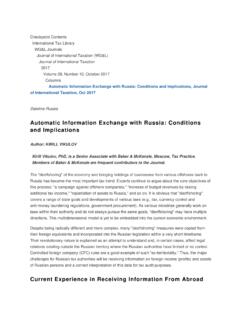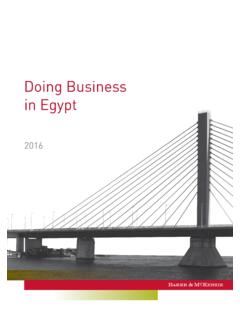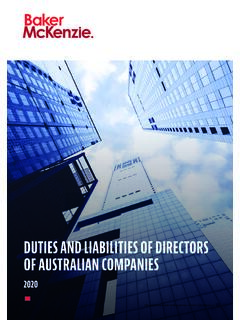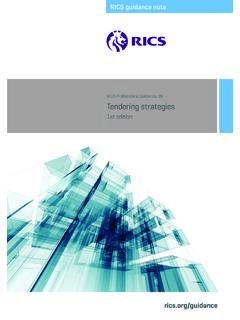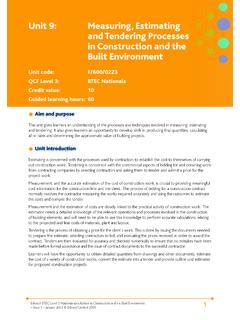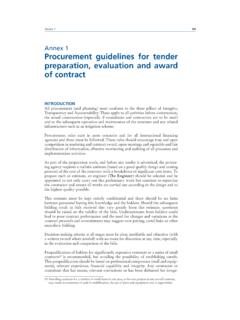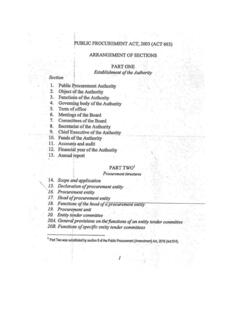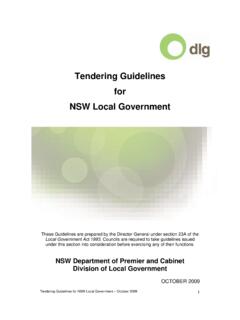Transcription of Everything you wanted to know about tendering but were ...
1 Everything you wanted to know about tendering but were afraid to ask 2 Acknowledgements: Sarah Fitzgerald and Angelique Wanner. Baker & McKenzie, an Australian Partnership, is a member firm of Baker & McKenzie International, a Swiss Verein with member law firms around the world. In accordance with the common terminology used in professional service organisations, reference to a "partner" means a person who is a partner, or equivalent, in such a law firm. Similarly, reference to an "office" means an office of any such law firm. 2015 Baker & McKenzie All rights reserved. FOR FURTHER INFORMATION, PLEASE CONTACT THE AUTHORS: Geoff Wood Partner +61 2 8922 5123 @ Jennifer Fitzalan Senior Associate +61 2 8922 5724 @ 3 1.
2 Introduction 4 2. Legal status of tendering process 4 3. Types of tendering 13 4. tendering Documentation 15 5. Issue 1 - Formation of a Process Contract 18 6. Issue 2 - Compliance with Assessment Criteria 30 7. Issue 3 - Privilege tender provisions and duty of fairness 33 8. Issue 4 - Exclusion of liability clauses 38 9. Issue 5 - Implied terms in tendering (good faith, confidentiality) 40 10. Issue 6 - E-tenders 47 11. Issue 7 - "Process contract"? - consequences 49 12. Issue 8 - Misrepresentation and Information provided to Tenderers 52 13. tendering for Government - Policies and Codes 56 4 1. Introduction The purpose of this Paper is to give a basic overview of the basics of tendering including: (a) the tendering process and the legal status of that process; (b) typical documentation issued as part of the tendering process; (c) issues which may arise as part of a tendering process including: (i) the formation of a "process contract"; (ii) "privilege clauses"; (iii) exclusion of liability by the person issuing the request for tender; (iv) compliance with expressly stated assessment criteria; (v) implied terms in the tendering process (good faith and confidentiality); (vi) E- tendering ; and (vii) misleading and deceptive conduct by the party issuing the request for tender; and (d) tendering for the public sector.
3 2. Legal status of tendering process Goods and services are often procured by both private enterprise and government bodies through a tendering process. One of the first steps in a tendering process is to issue a Request for Tender (RFT). An RFT has been defined in the Commonwealth Government's Procurement Guidelines 2008 as:1 a published notice inviting suppliers who satisfy the conditions for participation to submit a tender in accordance with the requirements of the request for tender and other request documentation. Issuing an RFT by a party (who for the purposes of this Paper will be referred to as the 'Principal') requesting that a tenderer submit a tender, is no more than an "invitation to treat",2 which has been described in Butterworths Australian Legal Dictionary as a "request to negotiate or make an offer with a contract in mind".
4 3 Issuing an RFT is not in law regarded as an "offer". In Pratt Contractors Ltd v Palmerston North City Council,4 Justice Gallen stated that:5 Authority makes it clear that the starting point is that a simple uncomplicated request for bids will generally be no more that an invitation to treat, not giving rise to contractual obligations, although it may give rise to obligations to act fairly. The submission of a tender by a party in response to an RFT is regarded in law as an "offer" by the An offer has been described as "a clear statement of the terms by which the 1 Commonwealth Procurement Guidelines, December 2008, Part C Definitions, 46. 2 NSW Government Procurement Guidelines, tendering Guidelines, December 2011, 8.
5 3 P. J. Butt, Butterworths Concise Australian Legal Dictionary (LexisNexis Butterworths, 3rd ed, 2004) 235. 4 [1995] 1 NZLR 469. 5 Ibid 478-479. 6 Ibid. 5 person making the offer is prepared to be bound".7 The mere provision of a price would not amount to an offer as the offeror (tenderer) has not stated the terms under which it is prepared to commit to the price As with an RFT, generally the provision of an offer by the tenderer (assuming a "process contract" has not been formed - see Part 5) will not be enforceable. Whether the acceptance of an "offer" forms a legally binding contract depends on the language of the original RFTs may take two general forms: (a) one where acceptance of an offer produces a binding contract (Section ); and (b) one where acceptance does not produce a binding contract (Section to ).
6 These two scenarios are discussed below in Section to Section The legal effect of issuing an RFT is different to the Principal merely seeking "expressions of interest". In such a case, a response to an "expression of interest" would not usually be regarded as an "offer" but merely a party providing information only to another However, referring to something as an "expression of interest" will not decide what legal implications (if any) will ensue as terms such as "tender" and "expression of interest" are not terms of The intention of the parties must be determined to establish the form of relationship. However, notwithstanding the above, as discussed in Part 5 of this Paper, in some circumstances a contract may be formed during the tendering process.
7 7 NC Seddon and MP Ellinghaus, Law of Contract (LexisNexis Butterworths, 9th ed, 2008), 109. 8 Harvey v Facey [1893] AC 552. 9 Ibid 128. 10 NC Seddon and MP Ellinghaus, Law of Contract (LexisNexis Butterworths, 9th ed, 2008) 129. 11 NC Seddon, Government Contracts (The Federation Press, 4th ed, 2008) 337. 6 Diagram 1 summarises the tendering process and when a contract may or may not be formed. Diagram 1 ---------------------------------------- ---------------------------------------- ---------------------- As illustrated in Diagram 1, subject to the comments in Part 5 of this Paper (which discusses Contract A Type Formation, that is, formation of a "Process Contract"), a legally binding contract is not usually formed until the tender process has been completed and a tender has been accepted (Contract B Type Formation).
8 In a typical tendering process, the successful tenderer will be required to enter a formal written contract with the Principal (in the form provided in the RFT). One issue to be considered in relation to Contract B Type Formation is: Does a binding contract to perform the work the subject of the tender eventuate on acceptance of the offer by the Principal or on execution of the formal written contract? To answer that question, the intention of the parties needs to be established including by reference to the RFT documents. RFT Issued by the Principal Tender submissions received by Tenderer Assessment of tender by the Principal Acceptance of an offer by the Principal Invitation to treat Offer Contract formed (on acceptance or on execution of formal contract) Contract A Type Possible Formation of a "Process Contract" (Refer to Part 5) Contract B Type Formation (Refer to this Part 1) Contract not formed Standing Offer only 7 The High Court in Masters v Cameron12 noted that where parties who have been in negotiation reach agreement upon terms and also agree that the matter of their negotiations will be dealt with by a formal contract, one of three classes may arise as follows.
9 (a) "It may be one in which the parties have reached finality in arranging all the terms of their bargain and intend to be immediately bound to the performance of those terms, but at the same time propose to have the terms restated in a form which will be fuller or more precise but not different in effect";13 (b) the parties intend to be immediately bound but may desire the performance of one or more conditional or delayed pending the execution of a formal document;14 or (c) the parties intend not to make a concluded bargain al all, unless and until a formal contract is drawn up and signed. Although not without controversy, a fourth category has been added where the parties intend to be immediately bound by the terms which they have agreed whilst anticipating the formation of a further contract with additional terms to replace the first Some examples of cases where a binding contract is or is not formed are discussed below.
10 12 (1954) 91 CLR 353, 362. 13 Godecke v Kirwan (1973) 129 CLR 629; South Coast Oils (Qld and NSW) Pty Ltd v Look Enterprises Pty Ltd [1988] 1 Qd 680; GR Securities Pty Ltd v Baulkham Hills Private Hospital Pty Ltd (1986) 40 NSWLR 631. 14 Niesmann v Collingridge (1921) 29 CLR 177; Godecke v Kirwan (1973) 129 CLR 629; Randwick City Council v Nancor trading Co Pty Ltd [2002] NSWCA 108. 15 NC Seddon and MP Ellinghaus, Law of Contract (LexisNexis Butterworths, 9th ed, 2008) 243. See Baulkham Hills Private Hospital Pty Ltd v G R Securities Pty Ltd (1986) 40 NSWLR 622, 628 and Graham Evans Pty Ltd v Stencraft Pty Ltd [1999] FCA 1670. 8 Where acceptance at the end of the tendering process DOES produce a binding contract (Contract B Type) In City of Box Hill v EW Tauschke Pty Ltd;16 (a) Tauschke Pty Ltd (Tauschke) was the successful tenderer for road works; (b) the RFT required Tauschke to sign a formal contract within 4 days of notification of acceptance of its tender.

